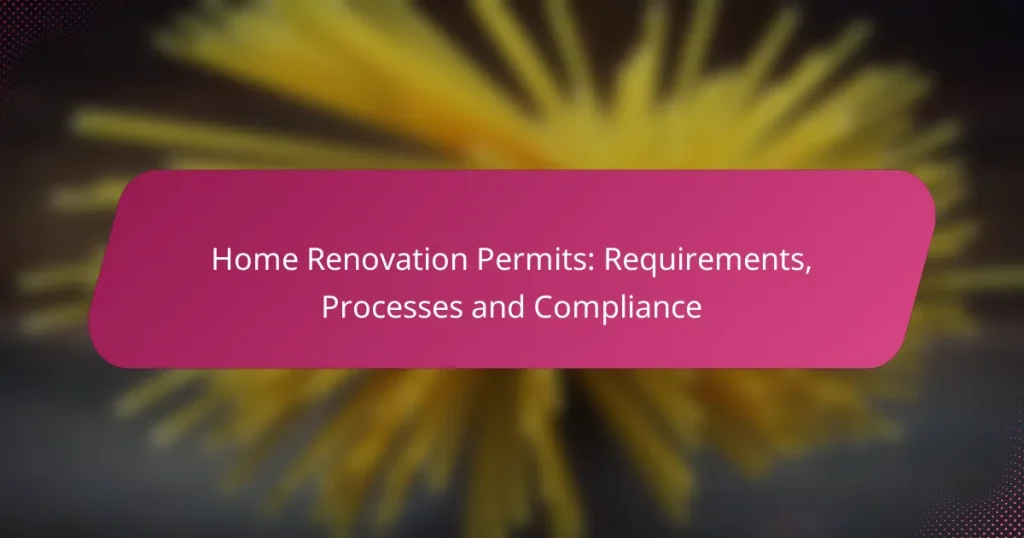Home renovation permits are essential in Los Angeles to ensure that all construction activities comply with local building codes and safety regulations. The type of permit required depends on the specific nature of the work, such as construction, electrical, or plumbing tasks. Understanding the application process and associated costs is crucial for homeowners to navigate the complexities of compliance effectively.

What home renovation permits are required in Los Angeles?
In Los Angeles, several home renovation permits are necessary to ensure compliance with local building codes and safety regulations. These permits vary based on the type of work being performed, including construction, electrical, plumbing, mechanical, and demolition tasks.
Building permits
Building permits are essential for most structural changes, including additions, alterations, and new constructions. To obtain a building permit in Los Angeles, you must submit detailed plans and specifications to the Department of Building and Safety (DBS) for review.
Common requirements include site plans, architectural drawings, and structural calculations. Fees typically range from a few hundred to several thousand dollars, depending on the project’s scope and complexity.
Electrical permits
Electrical permits are required for any significant electrical work, including new wiring, panel upgrades, and installations of new circuits. This ensures that all electrical systems meet safety standards and local codes.
When applying, you must provide a description of the work, along with plans showing the layout of circuits. Fees for electrical permits can vary, but they generally fall within a few hundred dollars.
Plumbing permits
Plumbing permits are necessary for any work involving water supply, drainage, or sewage systems. This includes installing new pipes, fixtures, or appliances that connect to the plumbing system.
To secure a plumbing permit, you must submit plans detailing the proposed work. Costs for plumbing permits usually range from a couple of hundred to over a thousand dollars, depending on the extent of the work.
Mechanical permits
Mechanical permits are required for the installation or alteration of heating, ventilation, and air conditioning (HVAC) systems. This ensures that these systems are installed safely and efficiently.
When applying for a mechanical permit, you need to provide specifications for the equipment and installation plans. Fees can vary based on the complexity of the installation, typically ranging from a few hundred to several hundred dollars.
Demolition permits
Demolition permits are necessary for tearing down any structure, whether partial or complete. This process helps ensure that demolitions are conducted safely and in compliance with environmental regulations.
To obtain a demolition permit, you must submit an application detailing the scope of the demolition and any plans for debris disposal. Fees for demolition permits can vary widely, often starting from a few hundred dollars and increasing based on the project’s size and complexity.

How to apply for home renovation permits in Los Angeles?
To apply for home renovation permits in Los Angeles, you can choose between an online or in-person application process. Understanding the requirements and necessary documentation is crucial to ensure compliance with local regulations.
Online application process
The online application process for home renovation permits in Los Angeles is straightforward. You can access the Department of Building and Safety’s website to submit your application electronically. This method is often faster and allows for easier tracking of your application status.
When applying online, ensure you have all required documents ready for upload. The system will guide you through the necessary steps, and you can typically pay fees using a credit or debit card.
In-person application process
If you prefer to apply in person, visit your local Department of Building and Safety office. It’s advisable to schedule an appointment to minimize wait times. Bring all necessary documentation to facilitate the process.
During your visit, a staff member will assist you in filling out the application and will provide information on applicable fees. Be prepared for potential follow-up visits if additional information is required.
Required documentation
- Site plans and architectural drawings
- Structural calculations if applicable
- Proof of contractor’s license, if hiring a contractor
Ensure all documents are accurate and complete to avoid delays in the approval process. Missing or incorrect information can lead to significant setbacks in your renovation timeline.

What are the costs associated with home renovation permits?
The costs associated with home renovation permits can vary significantly based on location, project scope, and local regulations. Generally, these costs include permit fees, inspection fees, and potential additional expenses that may arise during the renovation process.
Permit fees
Permit fees are the primary costs for obtaining the necessary approvals for your renovation project. These fees can range from a few dozen to several hundred dollars, depending on the complexity of the work and the municipality’s fee structure. It’s essential to check with your local building department for specific rates and any applicable discounts for certain types of projects.
Some jurisdictions may charge a flat fee for smaller projects, while larger renovations might incur fees based on the estimated cost of construction. Always factor these fees into your overall budget to avoid unexpected expenses.
Inspection fees
Inspection fees are charges for the required evaluations conducted by local authorities to ensure compliance with building codes and safety standards. These fees can vary, often falling within the range of $50 to $200 per inspection. Multiple inspections may be necessary throughout the renovation process, particularly for extensive projects.
It’s advisable to schedule inspections at critical stages of your renovation to avoid costly rework. Be aware that failing to pass an inspection can lead to additional fees and delays, so ensure all work meets local regulations before calling for an inspection.
Additional costs
In addition to permit and inspection fees, other costs may arise during the renovation process. These can include fees for professional services, such as architects or engineers, if their expertise is needed for your project. Additionally, some areas may require impact fees or utility connection fees, which can add to your overall expenses.
To manage these potential costs, consider creating a contingency budget of around 10-20% of your total renovation budget. This can help cover unforeseen expenses that may arise during the permitting and renovation phases.

What are the common challenges in obtaining home renovation permits?
Obtaining home renovation permits often involves navigating various challenges that can delay the process. Key issues include delays in approval, insufficient documentation, and non-compliance with local codes, all of which can hinder timely project completion.
Delays in approval
Delays in approval are a frequent challenge when securing home renovation permits. These delays can arise from a backlog in the permitting office, especially during peak renovation seasons, or from the complexity of the project requiring additional reviews.
To mitigate delays, homeowners should submit complete applications with all required information and follow up regularly with the permitting office. Understanding local timelines can also help set realistic expectations for when work can commence.
Insufficient documentation
Insufficient documentation is another common obstacle in the permitting process. Many homeowners underestimate the amount and type of paperwork needed, which can include detailed plans, specifications, and proof of ownership.
To avoid this issue, it is advisable to create a checklist of required documents based on local regulations. Consulting with a licensed contractor or architect can also ensure that all necessary documentation is prepared accurately and submitted on time.
Non-compliance with local codes
Non-compliance with local codes can lead to permit denials or costly revisions. Each municipality has specific building codes and zoning laws that must be adhered to, and failing to comply can result in fines or the need to redo work.
Homeowners should familiarize themselves with local regulations before starting renovations. Engaging professionals who are knowledgeable about local codes can help ensure compliance and streamline the permitting process.

What are the compliance requirements for home renovations?
Compliance requirements for home renovations typically include adherence to building codes, zoning regulations, and environmental regulations. Understanding these requirements is crucial to ensure that your renovation project is legal and safe.
Building codes
Building codes are sets of regulations that dictate the standards for construction and renovation projects. They cover aspects such as structural integrity, fire safety, and accessibility. Before starting a renovation, check your local building codes to ensure your plans meet the necessary standards.
Common requirements may include obtaining permits for electrical, plumbing, or structural changes. Failing to comply can result in fines or the need to undo completed work. Always consult with local authorities or a licensed contractor to navigate these codes effectively.
Zoning regulations
Zoning regulations determine how land can be used and what types of structures can be built in specific areas. These rules can affect setbacks, height restrictions, and the types of renovations allowed. Understanding zoning laws is essential to avoid conflicts with local authorities.
For instance, if you live in a residential zone, you may face limitations on commercial renovations or expansions. Always verify zoning classifications with your local planning department before proceeding with your renovation plans.
Environmental regulations
Environmental regulations are designed to protect natural resources and public health during renovation projects. These may include rules regarding waste disposal, hazardous materials, and energy efficiency. Compliance with these regulations is often mandatory and can influence project costs and timelines.
For example, if your renovation involves disturbing soil, you may need to conduct an environmental assessment. Additionally, using sustainable materials may not only comply with regulations but can also provide long-term savings. Always research local environmental laws to ensure your renovation is both compliant and eco-friendly.

How to ensure timely permit approval?
To ensure timely permit approval, start by understanding the specific requirements for your renovation project. This involves gathering necessary documentation, adhering to local regulations, and submitting your application correctly and completely.
BODY REQUIREMENTS
When preparing your permit application, ensure you have all required documents, such as site plans, construction drawings, and any relevant engineering reports. Missing or incomplete documentation can significantly delay the approval process.
Familiarize yourself with local building codes and zoning laws, as these can vary widely. Check with your local planning department to confirm what is needed for your specific project, as requirements can differ based on the type of renovation and location.
PROCESS STEPS
The permit approval process typically involves submitting your application to the local authority, which may include a review period where officials assess compliance with regulations. This can take anywhere from a few days to several weeks, depending on the complexity of your project and the workload of the permitting office.
After submission, be prepared for potential revisions. If the reviewing authority identifies issues, you may need to adjust your plans and resubmit, which can add to the timeline. Staying proactive and responsive can help mitigate delays.
COMPLIANCE CHECKLIST
To streamline the approval process, create a compliance checklist that includes all necessary documents, deadlines, and local regulations. This can help ensure you don’t overlook critical steps.
- Verify zoning requirements for your property.
- Gather all required documentation before submission.
- Follow up with the permitting office regularly to check on the status of your application.
Common pitfalls include submitting incomplete applications or failing to adhere to local codes. Double-checking your work and consulting with professionals can help avoid these issues.


